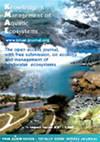Can Potamopyrgus antipodarum (Gastropoda) affect the prevalence of Trichobilharzia szidati in Lymnaea stagnalis populations?
IF 1.7
3区 环境科学与生态学
Q3 FISHERIES
引用次数: 1
Abstract
Swimmer's itch is an emerging disease caused by bird schistosomes affecting people all over the world. Lymnaeidae − main host snails in Europe − are the source of harmful cercariae of these zoonotic parasites. The aim of this work was to determine whether Polish lakes, inhabited by Potamopyrgus antipodarum (Gray, 1843), result in a lower potential risk of swimmer's itch compared to lakes uninhabited by this non-native snail species. As a result of the dilution effect created by increasing the diversity of co-occurring non-host targets for miracidia, the risk of this zoonosis may be reduced. We studied the prevalence of digenean trematodes in Lymnaea stagnalis (Linnaeus, 1758) populations from 30 water bodies partly inhabited by P. antipodarum. The bird schistosome infection in snail hosts was found in five lakes inhabited and 11 lakes uninhabited by the non-native snails. The prevalence of these parasitesin host snail populations in the lakes uninhabited was significantly higher than in lakes inhabited by P. antipodarum. We conclude that P. antipodarum seems to be a good potential target for reducing the risk of swimmer's itch via the dilution effect. We expect from our point of view to stimulate a discussion on the use of this species to protect bathing areas against the threat of swimmer's itch.腹足类动物是否会影响黑毛虱种群中黑毛虱的流行?
游泳者瘙痒是一种由鸟类血吸虫引起的新发疾病,影响着世界各地的人们。欧洲的主要寄主蜗牛是这些人畜共患寄生虫的有害尾蚴的来源。这项工作的目的是确定波兰的湖泊,居住着Potamopyrgus antipodarum (Gray, 1843),是否导致游泳者瘙痒的潜在风险低于没有这种非本地蜗牛物种居住的湖泊。由于增加了同时发生的miracidia非宿主靶点的多样性而产生的稀释效应,这种人畜共患病的风险可能会降低。本文研究了30个部分栖息于反足鲷(P. antipodarum)的水体中停滞鲷(Linnaeus, 1758)种群中地沟吸虫的流行情况。钉螺有居湖5个,无居湖11个,钉螺宿主感染鸟类血吸虫。无生境湖泊寄主蜗牛种群中寄生虫的流行率显著高于有生境湖泊寄主蜗牛种群。我们的结论是,P. antipodarum似乎是一个很好的潜在目标,通过稀释效应来降低游泳者瘙痒的风险。从我们的角度来看,我们期望激发关于使用这种物种来保护沐浴区免受游泳者瘙痒威胁的讨论。
本文章由计算机程序翻译,如有差异,请以英文原文为准。
求助全文
约1分钟内获得全文
求助全文
来源期刊

Knowledge and Management of Aquatic Ecosystems
环境科学-海洋与淡水生物学
CiteScore
3.70
自引率
5.60%
发文量
22
审稿时长
>12 weeks
期刊介绍:
Knowledge and Management of Aquatic Ecosystems (KMAE-Bulletin Français de la Pêche et de la Pisciculture since 1928) serves as a foundation for scientific advice across the broad spectrum of management and conservation issues related to freshwater ecosystems.
The journal publishes articles, short communications, reviews, comments and replies that contribute to a scientific understanding of freshwater ecosystems and the impact of human activities upon these systems. Its scope includes economic, social, and public administration studies, in so far as they are directly concerned with the management of freshwater ecosystems (e.g. European Water Framework Directive, USA Clean Water Act, Canadian Water Quality Guidelines, …) and prove of general interest to freshwater specialists. Papers on insular freshwater ecosystems and on transitional waters are welcome. KMAE is not a preferred journal for taxonomical, physiological, biological, toxicological studies, unless a clear link to ecological aspects can be established. Articles with a very descriptive content can be accepted if they are part of a broader ecological context.
 求助内容:
求助内容: 应助结果提醒方式:
应助结果提醒方式:


